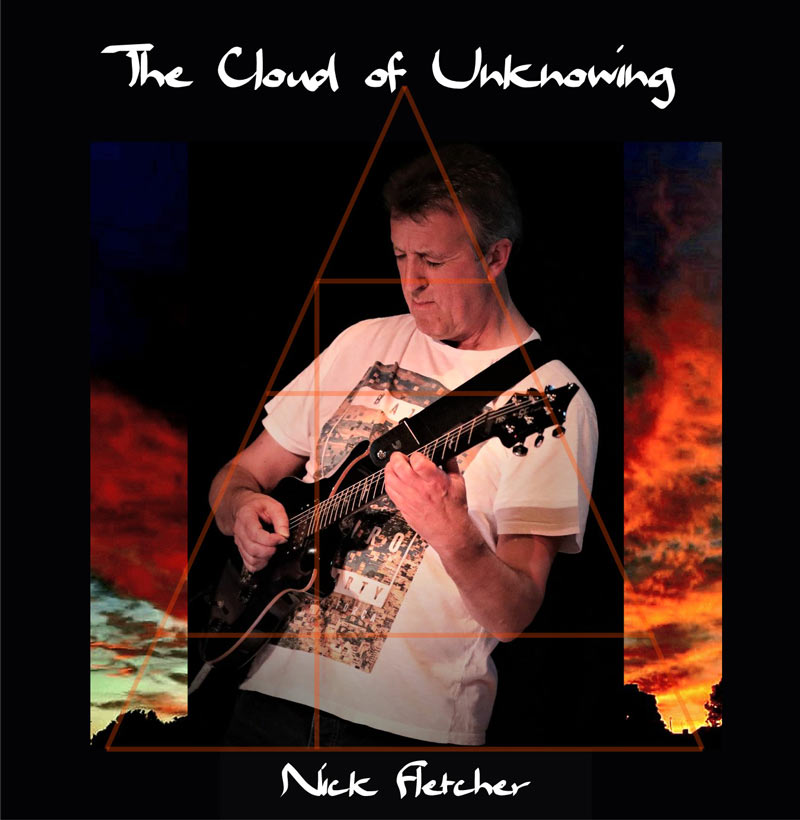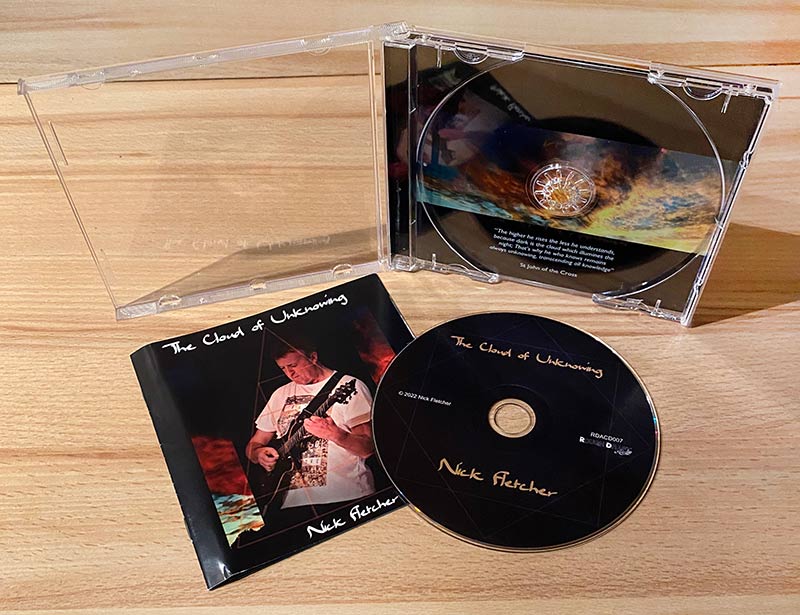- Artikel
- Lesezeit ca. 6 Minuten
Nick Fletcher – The Cloud Of Unknowing – review
A year after the highly acclaimed solo album Cycles Of Behaviour, Nick Fletcher (John Hackett Band) presents a follow-up with The Could Of Unknowing. Thomas Jesse has listened to it.

Preface:
The reviewer almost missed the follow-up to Nick Fletcher’s fantastic Cycles of Behaviour. This confirms what we said at the time – the work of this likeable person unfortunately gets far too little attention. With these lines, the reviewer would like to try it at least in the circles of Genesis fans.
Background / album title:
Amazingly fast, after one year, Nick Fletcher releases The Cloud Of Unknowing, another fine album marked by rock, prog, jazz and light metal touches. It is marked by the aftermath of the Corona pandemic and has as its content Nick Fletcher’s resulting search for a meaning of his/her life. Under the clear tray, you find a quotation of the Spanish Carmelite and mystic John of the Cross (1542 – 1591) *1. It forms the inspiration for the title of the album:
The higher he rises the less he understands, because dark is the cloud which illumines the night; That’s why what he knows remains always unknowing, transcending all knowledge.
In an interview, Nick says that these words and his study of the great mystic and medieval philosophy changed his view of the world and that he now finds joy in life in peace and solitude. *2
Artwork:
 The CD is available in a jewel case. A digital edition is also available on Nick’s website. The black cover shows us Nick playing guitar, in the background there are shots of cloud formations. The booklet contains song lyrics, a list of the musicians involved and a small acknowledgement. Liner notes are unfortunately missing. Again, there are shots of the sky, church entrances – and interiors, as well as a hill (Glastonbury Tor, or Solsbury Hill? Probably not.) This illustrates the intention of the album to sketch mysticism in harmony with nature. Photos and layout design were taken care of by Nick Fletcher himself.
The CD is available in a jewel case. A digital edition is also available on Nick’s website. The black cover shows us Nick playing guitar, in the background there are shots of cloud formations. The booklet contains song lyrics, a list of the musicians involved and a small acknowledgement. Liner notes are unfortunately missing. Again, there are shots of the sky, church entrances – and interiors, as well as a hill (Glastonbury Tor, or Solsbury Hill? Probably not.) This illustrates the intention of the album to sketch mysticism in harmony with nature. Photos and layout design were taken care of by Nick Fletcher himself.
The contributors of the album are the old acquaintances from the predecessor with two exceptions: John Hackett is no longer in the band. Thus, in contrast to Cycles Of Behaviour (where he cooperated with John on three tracks), Nick Fletcher composed all the songs himself.
Stuart Barbour sings the only two non-instrumental tracks. Nick chose him, a friend of Caroline Bennett, who again recorded, mixed and mastered the album, because he has a very good, typically English voice. Nick wanted a singer somewhat reminiscent of John Wetton’s vocal style.
Songs:
The center of the album is the long track Scenes from the Subconscious Mind (Suite)with five scenes in a length of over 23 minutes. The suite is framed by two pieces each at the beginning and the end of the album.
Out of the Maelstrom
Gloomy keyboard sounds open the maw of the maelstrom that devours the listener with crashing jazz rock escapades. The Mahavishnu Orchestra sends its regards. Wonderful thundering outbursts of the Hammond organ, played by Dave Bainbridge, pair with Nick’s wonderful guitar. After a good five minutes the instrumental piece ends abruptly. What a banger to start the album! What a worthy connection to the predecessor!
The Eyes of Persephone
How beautifully the eyes of Persephone shine! The underworld seems to be a place of tranquility. Dreamy, intricate guitar solos, paired with piano and synthesizer sounds, invite the listener to drift away into other spheres. Beautiful piano solo from minute 2:30. Again Dave Bainbridge can distinguishes himself again. Tim Harries plays the bass unobtrusively. The contrast and the breathing space after the odyssey through the Maelstrom are wonderfully successful. An album favorite of the reviewer, who is reminded of U.K. with Allan Holdsworth. Yes, even Peter Green’s blues guitar is quoted. However, Nick Fletcher is by no means a copyist.
Scenes from the Subconscious Mind – Suite
After the excursion into Greek mythology, it is now time to take a breath for the long track of the album. It is introduced by:
Scene 1: We Need to Leave this Place?Right Now!
Twenty seconds of soundscapes, sounds of a big city, airplane rumbling, screeching tires, screams, the siren of an ambulance – and then it crashes.
Scene 2: Pandemonium
A thundering, metallic guitar orgy startles the listener. According to the song title, this is really a tearing chaos over which Nick lays a dominating jazz-rock guitar track. Great drumming by Russ Wilson! Starting at minute 2:20, the music wanders into quiet territory with a gorgeous Hackett-esque guitar solo. Nick plays beautifully proggy, jazzy until minute 4 when the chaos of the first half of the song resumes and ends in a furious finale.
Scene 3: The Cloud of Unknowing part 1 – part 2 – part 3
The track that lends its title to the album is heralded in its first part with church bells caught in a keyboard carpet. These somber keyboards played by Caroline Bonnett give nightmarish thoughts of large echoing rooms in sacred buildings. With guitar arpeggios and the appearance of singer Stuart Barbour, who reminds more of Roine Stolt than of John Wetton, the second part begins. It is interrupted by a two-minute guitar solo and jazz rock escapades by the band. Stuart sings of the search for knowledge, for truth in the darkness. The song continues with guitar arpeggios overlaid with a solo in its third section. This one evokes comparisons with Iona, beautifully melodic and dreamy. Quietly the guitar fades away, evoking the image of a paradisiacal landscape.
Here the album is all on the progressive rock side. The Flower Kings greet with their playfulness.
Scene 4: Awakening the Hydra
Dark, chorus-like soundscapes, creaking, plinking guitar. Before you completely fall into the mood of Tigermothof a Steve Hackett, metal-like sounds call to the …
Scene 5: Dance of the Hydra
Nick Fletcher combines rhythmic metal (guitar) accents with a soloing jazz rock guitar. When has this reviewer ever heard that before? The Hydra leads the listener with its dance back into Pandemonium. It cajoles from minute 2:50 with a quieter interruption of chaos, with drums and guitar competing. It’s only a brief interlude, however, until rocking out again, this time more jazzy. A beautiful guitar melody leads us to the end of the dance, which quotes the Awakening of the Hydra. Has it captivated enough listeners to go back to sleep? With a quiet ending, the scenes end and a breathless listener is left behind.
Arcadia:
Two minutes of a duet of acoustic guitar and soft keyboards gives the listener an opportunity to catch his/her breath. Nick proves his ability as a classically trained musician. Perhaps a dab of John Hackett’s flute would have enhanced the piece? Well, the reviewer feels comfortable in Arcadia even without it – beautiful…
The Paradox part 1 – part 2:
 With Stuart Barbour’s vocals struggling with jazzy sounds, the song begins. He does it so well that it doesn’t even need a guitar solo to grab attention. The keyboards caress the vocals with flute-like melodies, and from minute 2:25 a keyboard solo creates memories of U.K. or Bruford. Of course, Nick lets his guitar speak again and delights us with a magnificent solo that crowns the song fantastically. With harmonious vocals reciting a melancholic lyric, the track moves towards its end. It ends with moving guitar playing, soft siren vocals of Caroline Bonnett and synthesizer sounds.
With Stuart Barbour’s vocals struggling with jazzy sounds, the song begins. He does it so well that it doesn’t even need a guitar solo to grab attention. The keyboards caress the vocals with flute-like melodies, and from minute 2:25 a keyboard solo creates memories of U.K. or Bruford. Of course, Nick lets his guitar speak again and delights us with a magnificent solo that crowns the song fantastically. With harmonious vocals reciting a melancholic lyric, the track moves towards its end. It ends with moving guitar playing, soft siren vocals of Caroline Bonnett and synthesizer sounds.
All in all
Where does Nick Fletcher get his inspiration, his creativity *3? He has followed up the sensational Cycles of Behaviour with another collection of wonderful music, The Cloud of Unknowing. He embeds quotes from bands / musicians like U.K., Bruford, Mahavishnu Orchestra, Iona and Steve Hackett into his own style of jazz, rock, prog. He keeps fusion music alive with his signature and even adds new touches. The music flows organically, blending into each other without seeming forced. It captivates the attentive listener. The reviewer is taken with the idea of merging the mysticism of Greek antiquity and the Middle Ages with this timeless music. Balm for the soul in these times. Hopefully, we will hear much more from Nick Fletcher. The reviewer would look forward to that and asks the gentle reader to give Nick Fletcher a bit of their lifetime. It is worth it.
Closing words from the booklet (preface to The Cloud of Unknowing) fit this time:
Da pacem, Domine,
in diebus nostris,
quia non est alius
qui pugnet pro nobis,
nisi tu Deus noster.
Grant us peace graciously,
Lord God, in our time.
For there is no other,
who could fight for us,
but you, our God, alone
Original text from the 9th century, published by Luther in 1529 as a retelling. *4
Author: Thomas Jesse
The album is available on Nick Fletcher’s website.
Remarks
*1: see here
*2: Interviewby John Wenlock-Smith:
*3: Last year he released a collaboration with John Hackett, The Goldfinch. A collection of music for guitar and flute by composers such as J.S. Bach, Handel, Scarlatti and Vivaldi. Available here.
*4: see here
